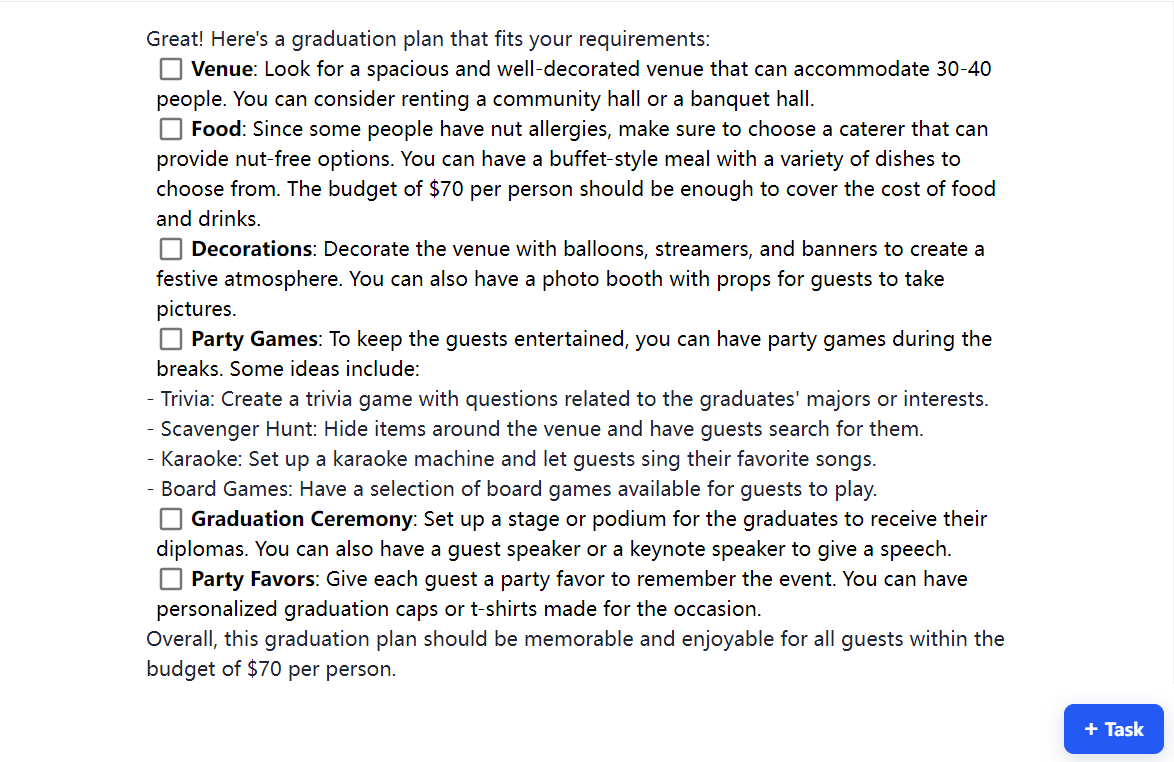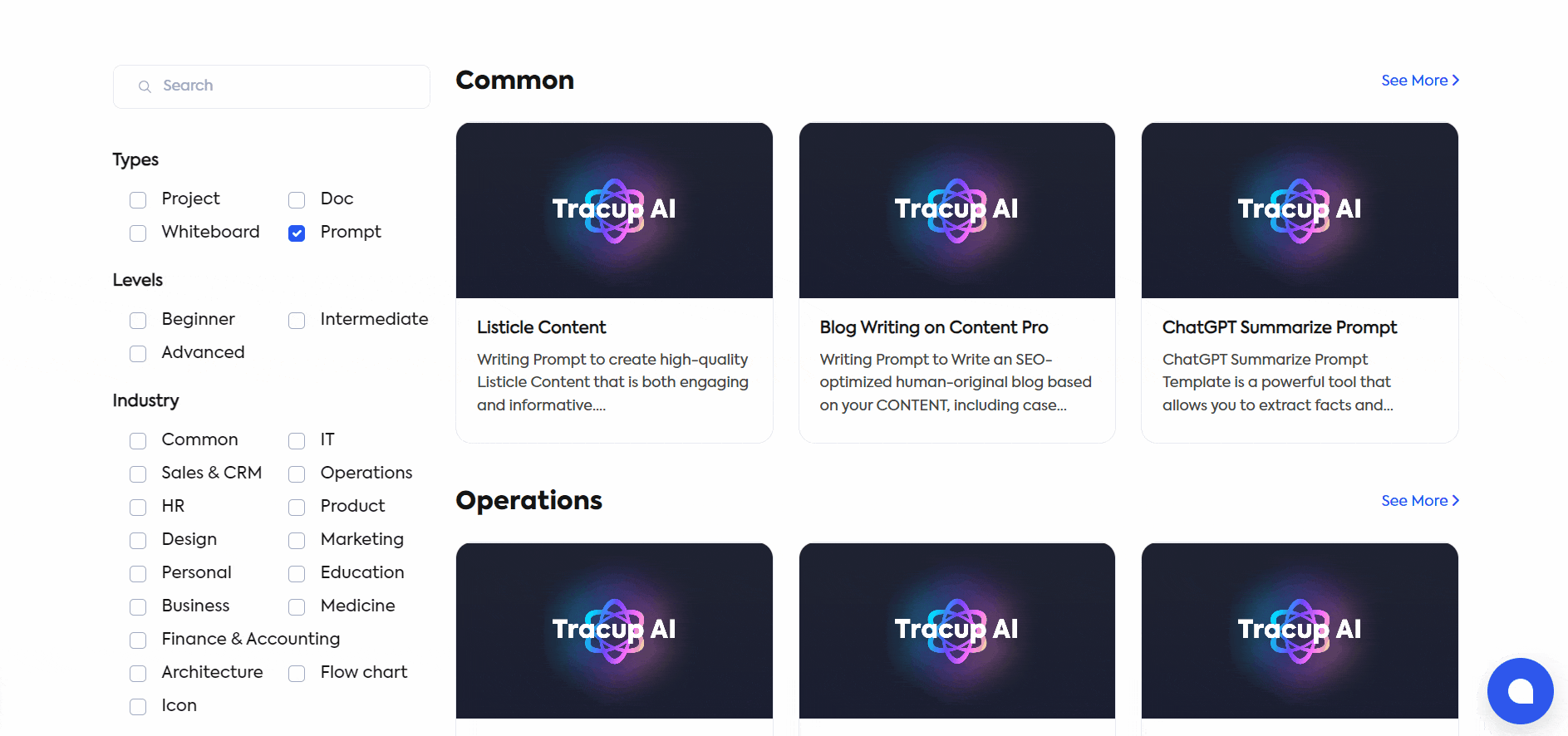How to Make the Most of Tracup AI Prompts for Streamlined Work Management
From ensuring relevant and accurate responses to supporting multilingual capabilities, discover how prompt templates can enhance user experience while improving efficiency and consistency.
Tracup AI is a recent upgrade to Tracup. With Tracup AI, you can automate tasks, generate content, and complete projects faster and more efficiently than ever before.
In this blog, we will emphasize the importance of prompt templates and discuss how they can improve the accuracy and usefulness of AI-generated responses.
What are Prompt Templates?
Prompt templates are pre-defined prompts that are designed to provide context and direction for AI models, such as Tracup AI. They are created based on a specific topic or content, and they provide a clear and concise direction for the AI model to follow.
For example, if the topic is “travel,” the prompt template may include questions such as “What are the best places to visit in Paris?“ or “What are some budget-friendly travel options in Europe?“ These prompts provide a clear direction for the AI model to generate relevant and accurate responses.
Tracup prompt templates would also give certain instructions of content writing, such as avoid first/second person tones, use formal expressions, or give a word limit. Some prompts even includes instructions of famous authors’ styles. For example, if you want to create a story in Shakespeare style, find the prompt that says “Story as William Shakespeare“ and apply it to Tracup AI. Every time you click that prompt from Tracup AI, it will input “Good at starting from the reality of life, showcasing a broad social background, and providing a typical environment rich in the characteristics of the times for the characters and events in the work; The plot of the work should be vivid and rich, with characters having distinct personalities and typical meanings” that related to Shakespeare writing style in the background.

5 reasons why prompt templates are important for using Tracup AI
Ensure Relevant and Accurate Responses
Prompt templates provide a clear direction for the AI model to follow, which helps to generate more relevant and accurate responses. Without a prompt template, the AI model may generate irrelevant or inaccurate responses, which can lead to confusion and frustration for the user. By using prompt templates, AI models can focus on generating responses that address the user’s specific needs or questions.
Simple instruction example: write me a graduation party plan

Detailed instruction example: I want you to come up a graduation plan. We will have 30 - 40 participants from age 20 to 27. Some people are nut allergy. Our budget is up to $70 per person. We want this party to be memorable. Also we want some party games between breaks.

It is obvious that the more details and instructions you provide, the more satisfactory and relevant the content generated by AI will be. Tracup prompt template is designed to help users use AI more effectively by saving them the time and effort of having to think of prompts themselves. We believe that every user who has used this feature will love it.
Improve Efficiency and Consistency
Prompt templates can help to save time and resources. Instead of manually inputting prompts for every use case, prompt templates can be pre-defined and used across multiple use cases, which can save time and reduce the risk of errors. Moreover, prompt templates ensure consistency in the responses generated by the AI model.

Enhance User Experience
Prompt templates can help to enhance the user experience by enabling the AI model to provide more relevant and accurate responses. This helps to build trust and confidence in the AI model, which can lead to increased user satisfaction and engagement.

Facilitate Model Training
Prompt templates can be used to train AI models, which can improve their accuracy and usefulness. By using prompt templates during training, AI models can learn to generate responses that are relevant and accurate based on the context of the prompt. This can help to improve the overall performance of the AI model.

Support Multilingual Capabilities
Prompt templates can be used to support multilingual capabilities in AI models. By creating prompt templates in different languages, AI models can generate responses in multiple languages, which can improve their usefulness and accessibility for users around the world.

How Prompt Templates Improve the Accuracy of AI-Generated Responses
Prompt templates improve the accuracy of AI-generated responses by providing a clear and concise direction for the AI model to follow. By using pre-defined prompts that are specific to a particular topic or content, the AI model can generate more relevant and accurate responses.
For example, if the topic is “healthcare,” the prompt template may include questions such as “What are the symptoms of COVID-19?“ or “What are the treatment options for diabetes?” These prompts provide a clear direction for the AI model to generate relevant and accurate responses that address the user’s specific needs or questions.
Additionally, prompt templates can be customized based on the user’s preferences or needs. For example, if the user is looking for information on a specific medication, the prompt template can be customized to include questions related to that medication, such as “What are the side effects of X medication?” or “What are the interactions between X medication and other drugs?”
Conclusion
Prompt templates are a valuable tool for enhancing the accuracy and usefulness of AI-generated responses. They not only save time and resources but also offer a personalized touch through customization. For those new to AI, prompt templates can serve as a helpful guide, while also addressing specific questions and ensuring scalability across various scenarios. Ultimately, prompt templates contribute to a better user experience by streamlining the AI interaction process.
- Improving accuracy and usefulness: Prompt templates provide a clear direction for AI models, ensuring they generate relevant and accurate responses tailored to user requirements.
- Time-saving tool: By offering pre-defined prompts, prompt templates save users time and resources that would otherwise be spent crafting multiple prompts for similar use cases.
- Customization: Prompt templates can be adjusted according to user preferences or needs, further enhancing the accuracy and practicality of AI-generated responses.
- Guidance for using AI: Prompt templates can serve as a helpful starting point for users who are unsure how to leverage AI effectively, offering a blueprint for generating desired content.
- Addressing specific questions: By utilizing prompts that cater to particular topics or content, users can ensure AI-generated responses directly address their unique inquiries and concerns.
- Scalability: Prompt templates can be applied across various scenarios, making them a highly versatile and efficient tool for generating AI responses.
- Enhancing user experience: By streamlining the AI interaction process, prompt templates can significantly reduce user effort and contribute to a better overall experience when working with AI systems.
Discover more at Tracup! See our blogs for advanced features of Tracup!
Try Tracup Free and Start Your Productivly Development
Using Tracup to Unlock Powerful Agile Workflow WITHOUT ANY Agile Experiences Required